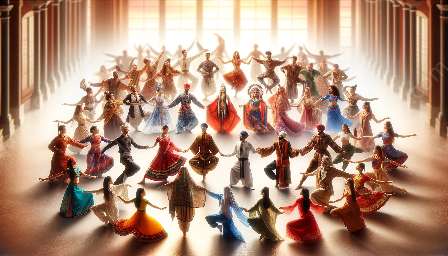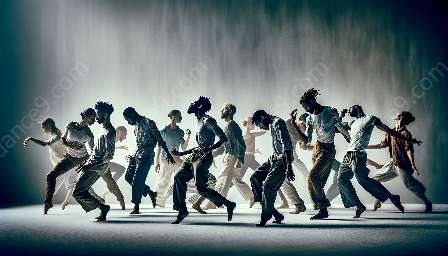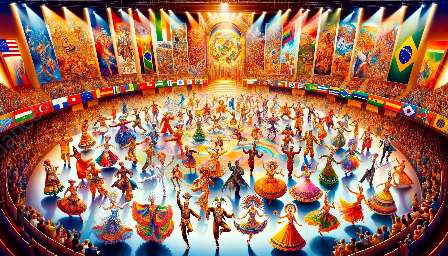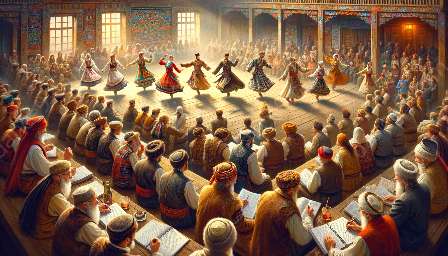Colonialism has had a significant impact on cultural dance forms in performing arts education, influencing the way these forms are perceived, practiced, and taught. By delving into the complexities of this topic, it becomes apparent that the effects of colonialism have shaped cultural dance forms in profound ways, affecting their preservation, evolution, and interpretation.
The Influence of Colonialism on Cultural Dance Forms
Colonial powers often sought to impose their own cultural norms and values on the societies they colonized, leading to the suppression and erasure of indigenous dance traditions. As a result, many cultural dance forms faced marginalization and even extinction, with colonial influences reshaping the dynamics of traditional dance practices.
One of the key implications of colonialism on cultural dance forms is the introduction of foreign dance techniques and choreographic styles, which often overshadowed or diluted native dance traditions. This led to a gradual shift in the way dance was conceptualized and performed, as indigenous influences were gradually supplanted by colonial aesthetics and ideologies.
Furthermore, the commodification of cultural dance forms by colonial powers led to the objectification and exoticization of these art forms, altering their original meanings and symbolism. This not only distorted the authenticity of the dances but also perpetuated harmful stereotypes and misconceptions about indigenous cultures.
Colonialism and its Impact on Performing Arts Education
Within the context of performing arts education, the effects of colonialism are palpable in the way cultural dance forms are studied and taught. Curriculum and pedagogical approaches often reflect colonial biases, emphasizing European dance traditions while downplaying the significance of indigenous dance forms.
Additionally, the lack of representation and recognition of cultural dance forms within educational institutions perpetuates the marginalization of these art forms, inhibiting the holistic understanding and appreciation of diverse dance practices. This perpetuates existing power imbalances and reinforces the dominant narrative of Western superiority in dance education.
Resisting Colonial Influences Through Dance Theory and Criticism
Understanding the implications of colonialism on cultural dance forms necessitates an exploration of dance theory and criticism that challenges Eurocentric perspectives. By adopting a decolonial approach, scholars and practitioners in the field of dance can actively work towards decolonizing dance education and restoring the integrity of cultural dance forms.
Reclaiming indigenous dance practices and elevating their significance within dance theory and criticism is essential for dismantling the pervasive legacy of colonialism. This involves amplifying the voices of marginalized communities, acknowledging the historical context of colonial oppression, and interrogating the power dynamics that have shaped dance discourse.
Moreover, an inclusive approach to dance theory and criticism acknowledges the interconnectedness of cultural dance forms, highlighting their shared histories and interconnectedness. By fostering a more comprehensive understanding of dance as a global phenomenon, the impact of colonialism can be mitigated, allowing for a more equitable and culturally diverse discourse within the field of dance.
Empowering Cultural Dance Forms in a Post-Colonial Context
As we navigate a post-colonial world, it is imperative to recognize the resilience and adaptability of cultural dance forms, despite the adversities imposed by colonialism. Embracing a post-colonial perspective involves valuing and honoring the richness of diverse cultural dance traditions, while actively challenging colonial legacies that continue to influence the performing arts.
Empowering cultural dance forms in a post-colonial context involves supporting initiatives that prioritize cultural exchange, collaboration, and inclusivity. This fosters a dynamic and reciprocal relationship between cultural dance traditions, allowing for innovative cross-cultural dialogue and artistic expression that transcends colonial boundaries.
Conclusion
The implications of colonialism on cultural dance forms in performing arts education are far-reaching and multifaceted. By acknowledging the historical injustices and ongoing repercussions of colonialism, we can strive to create a more inclusive and culturally sensitive approach to the study and practice of dance. Through critical engagement with dance theory and criticism, coupled with a commitment to decolonization, we can work towards revitalizing and honoring diverse cultural dance forms, ultimately celebrating the resilience and beauty of dance as a universal form of expression.

















